|
|
|
Sort Order |
|
|
|
Items / Page
|
|
|
|
|
|
|
| Srl | Item |
| 1 |
ID:
128265
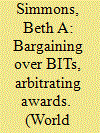

|
|
|
|
|
| Publication |
2014.
|
| Summary/Abstract |
The regime for international investment is extraordinary in public international law and controversial in many regions of the world. This article explores two aspects of this set of rules: its decentralization and the unusual powers it gives to private actors to invoke dispute settlement. Decentralization has contributed to a competitive environment for ratification of bilateral investment treaties (BITs) and has elevated the importance of dyadic bargaining power in the formation of the regime. Governments of developing countries are more likely to enter into BITs and tie their hands more tightly when they are in a weak bargaining position, which in turn is associated with economic downturns of the domestic economy. Once committed, investors have sued governments with surprising regularity, arguably contributing disproportionately to legal awards that favor the private corporate actors who have the power to convene the dispute settlement system. States have begun to push back, revising their obligations and attempting to annul arbitral awards. One of the conclusions is that it is important not only to consider whether BITs attract capital-which has been the focus of nearly all the empirical research on BIT effects-but also to investigate the governance consequences of the international investment regime generally.
|
|
|
|
|
|
|
|
|
|
|
|
|
|
|
|
| 2 |
ID:
178565
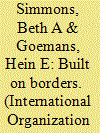

|
|
|
|
|
| Summary/Abstract |
The Liberal International Order is in crisis. While the symptoms are clear to many, the deep roots of this crisis remain obscured. We propose that the Liberal International Order is in tension with the older Sovereign Territorial Order, which is founded on territoriality and borders to create group identities, the territorial state, and the modern international system. The Liberal International Order, in contrast, privileges universality at the expense of groups and group rights. A recognition of this fundamental tension makes it possible to see that some crises that were thought to be unconnected have a common cause: the neglect of the coordinating power of borders. We sketch out new research agendas to show how this tension manifests itself in a broad range of phenomena of interest.
|
|
|
|
|
|
|
|
|
|
|
|
|
|
|
|
| 3 |
ID:
147547
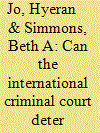

|
|
|
|
|
| Summary/Abstract |
Whether and how violence can be controlled to spare innocent lives is a central issue in international relations. The most ambitious effort to date has been the International Criminal Court (ICC), designed to enhance security and safety by preventing egregious human rights abuses and deterring international crimes. We offer the first systematic assessment of the ICC's deterrent effects for both state and nonstate actors. Although no institution can deter all actors, the ICC can deter some governments and those rebel groups that seek legitimacy. We find support for this conditional impact of the ICC cross-nationally. Our work has implications for the study of international relations and institutions, and supports the violence-reducing role of pursuing justice in international affairs.
|
|
|
|
|
|
|
|
|
|
|
|
|
|
|
|
| 4 |
ID:
023321
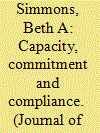

|
|
|
|
|
| Publication |
Dec 2002.
|
| Description |
829-856
|
|
|
|
|
|
|
|
|
|
|
|
|
|
|
|
| 5 |
ID:
075221


|
|
|
|
|
| Publication |
2006.
|
| Summary/Abstract |
Over the past forty-five years, bilateral investment treaties (BITs) have become the most important international legal mechanism for the encouragement and governance of foreign direct investment. The proliferation of BITs during the past two decades in particular has been phenomenal. These intergovernmental treaties typically grant extensive rights to foreign investors, including protection of contractual rights and the right to international arbitration in the event of an investment dispute. How can we explain the widespread adoption of BITs? We argue that the spread of BITs is driven by international competition among potential host countries-typically developing countries-for foreign direct investment. We propose a set of hypotheses that derive from such an explanation and develop a set of empirical tests that rely on network measures of economic competition as well as more indirect evidence of competitive pressures on the host to sign BITs. The evidence suggests that potential hosts are more likely to sign BITs when their competitors have done so. We find some evidence that coercion and learning play a role, but less support for cultural explanations based on emulation. Our main finding is that the diffusion of BITs is associated with competitive economic pressures among developing countries to capture a share of foreign investment. We are agnostic at this point about the benefits of this competition for development.
|
|
|
|
|
|
|
|
|
|
|
|
|
|
|
|
| 6 |
ID:
095023


|
|
|
|
|
| Publication |
2010.
|
| Summary/Abstract |
The creation of an International Criminal Court (ICC) to prosecute war crimes poses a real puzzle. Why was it created, and more importantly, why do states agree to join this institution? The ICC represents a serious intrusion into a traditional arena of state sovereignty: the right to administer justice to one's one nationals. Yet more than one hundred states have joined. Social scientists are hardly of one mind about this institution, arguing that it is (alternately) dangerous or irrelevant to achieving its main purposes: justice, peace, and stability. By contrast, we theorize that the ICC is a mechanism to assist states in self-binding, and draw on credible commitments theory to understand who commits to the ICC, and the early consequences of such commitments. This approach explains a counterintuitive finding: the states that are both the least and the most vulnerable to the possibility of an ICC case affecting their citizens have committed most readily to the ICC, while potentially vulnerable states with credible alternative means to hold leaders accountable do not. Similarly, ratification of the ICC is associated with tentative steps toward violence reduction and peace in those countries precisely least likely to be able to commit credibly to foreswear atrocities. These findings support the potential usefulness of the ICC as a mechanism for some governments to commit to ratchet down violence and get on the road to peaceful negotiations.
|
|
|
|
|
|
|
|
|
|
|
|
|
|
|
|
| 7 |
ID:
170024


|
|
|
|
|
| Summary/Abstract |
International regulatory agreements depend largely on self-reporting for implementation, yet we know almost nothing about whether or how such mechanisms work. We theorize that self-reporting processes provide information for domestic constituencies, with the potential to create pressure for better compliance. Using original data on state reports submitted to the Committee Against Torture, we demonstrate the influence of this process on the pervasiveness of torture and inhumane treatment. We illustrate the power of self-reporting regimes to mobilize domestic politics through evidence of civil society participation in shadow reporting, media attention, and legislative activity around antitorture law and practice. This is the first study to evaluate systematically the effects of self-reporting in the context of a treaty regime on human rights outcomes. Since many international agreements rely predominantly on self-reporting, the results have broad significance for compliance with international regulatory regimes globally.
|
|
|
|
|
|
|
|
|
|
|
|
|
|
|
|
| 8 |
ID:
160335
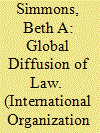

|
|
|
|
|
| Summary/Abstract |
In the past few decades new laws criminalizing certain transnational activities have proliferated: from money laundering, corruption, and insider trading to trafficking in weapons and drugs. Human trafficking is one example. We argue that criminalization of trafficking in persons has diffused in large part because of the way the issue has been framed: primarily as a problem of organized crime rather than predominantly an egregious human rights abuse. Framing human trafficking as an organized crime practice empowers states to confront cross-border human movements viewed as potentially threatening. We show that the diffusion of criminalization is explained by road networks that reflect potential vulnerabilities to the diversion of transnational crime. We interpret our results as evidence of the importance of context and issue framing, which in turn affects perceptions of vulnerability to neighbors' policy choices. In doing so, we unify diffusion studies of liberalization with the spread of prohibition regimes to explain the globalization of aspects of criminal law.
|
|
|
|
|
|
|
|
|
|
|
|
|
|
|
|
| 9 |
ID:
075220


|
|
|
|
|
| Publication |
2006.
|
| Summary/Abstract |
Political scientists, sociologists, and economists have all sought to analyze the spread of economic and political liberalism across countries in recent decades. This article documents this diffusion of liberal policies and politics and proposes four distinct theories to explain how the prior choices of some countries and international actors affect the subsequent behavior of others: coercion, competition, learning, and emulation. These theories are explored empirically in the symposium articles that follow. The goal of the symposium is to bring quite different and often isolated schools of thought into contact and communication with one another, and to define common metrics by which we can judge the utility of the contending approaches to diffusion across different policy domains.
|
|
|
|
|
|
|
|
|
|
|
|
|
|
|
|
| 10 |
ID:
119476
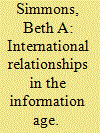

|
|
|
| 11 |
ID:
106923
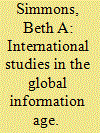

|
|
|
|
|
| Publication |
2011.
|
| Summary/Abstract |
The Global Information Age poses new and interesting questions for the study of international affairs. This Presidential Address surveys recent developments in commercialized and globalized information technologies that have and will continue to impact political and social relationships around the world. These new technologies affect power relationships among states, as well between states and civil society. They also present possibilities for new forms of global accountability and participation in governance. Finally, a range of technologies offer new and powerful ways to collect data for our research that allow us to ask new questions. President Simmons concludes as a result that exploratory empirical research is more enticing than ever before, but cautions that we should never think we can outsource the hard job of thinking to the very technologies that make innovative research possible in the first place.
|
|
|
|
|
|
|
|
|
|
|
|
|
|
|
|
| 12 |
ID:
164458
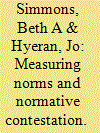

|
|
|
|
|
| Summary/Abstract |
One way to tell if an international norm is robust is to assess the breadth of its support from a wide variety of important actors. We argue that, to assess norm robustness, we should look at the general beliefs, rhetorical support, and actions of both primary and secondary norm addressees (states and nonstate actors) at various levels: international, regional, domestic, and local. By way of example, we evaluate the robustness of international criminal law (ICL) norms by looking at the rhetoric and actions of a diverse set of international actors, including not only states and intergovernmental organizations but also ordinary publics, rebel groups, and nongovernmental organizations. Assessing evidence of norms beyond states leads us to conclude that the core ICL norms are robust, but their practical and institutional applicability are still contested. Contestation over applicability is important, and there are hints that it is growing, at least among some key actors, suggesting the possibility of ICL norm decay.
|
|
|
|
|
|
|
|
|
|
|
|
|
|
|
|
| 13 |
ID:
139523


|
|
|
|
|
| Summary/Abstract |
Among the explanations for state ratification of human rights treaties, few are more common and widely accepted than the conjecture that states are rewarded for ratification by other states. These rewards are expected to come in the form of tangible benefits—foreign aid, trade, and investment—and intangible benefits such as praise, acceptance, and legitimacy. Surprisingly, these explanations for ratification have never been tested empirically. We summarize and clarify the theoretical underpinnings of “reward-for-ratification” theories and test these propositions empirically by looking for increased international aid, economic agreements, and public praise and recognition following ratification of four prominent human rights treaties. We find almost no evidence that states can expect increased tangible or intangible rewards after ratification. Given the lack of empirical support, alternative explanations seem more appealing for understanding human rights treaty ratification.
|
|
|
|
|
|
|
|
|
|
|
|
|
|
|
|
| 14 |
ID:
177783


|
|
|
|
|
| Summary/Abstract |
The international community often seeks to promote political reforms in recalcitrant states. Recently, some scholars have argued that, rather than helping, international law and advocacy create new problems because they have negative spillovers that increase rights violations. We review three mechanisms for such spillovers: backlash, trade-offs, and counteraction and concentrate on the last of these. Some researchers assert that governments sometimes “counteract” international human rights pressures by strategically substituting violations in adjacent areas that are either not targeted or are harder to monitor. However, most such research shows only that both outcomes correlate with an intervention—the targeted positively and the spillover negatively. The burden of proof, however, should be as rigorous as those for studies of first-order policy consequences. We show that these correlations by themselves are insufficient to demonstrate counteraction outside of the narrow case where the intervention is assumed to have no direct effect on the spillover, a situation akin to having a valid instrumental variable design. We revisit two prominent findings and show that the evidence for the counteraction claim is weak in both cases. The article contributes methodologically to the study of negative spillovers in general by proposing mediation and sensitivity analysis within an instrumental variables framework for assessing such arguments. It revisits important prior findings that claim negative consequences to human rights law and/or advocacy, and raises critical normative questions regarding how we empirically evaluate hypotheses about causal mechanisms.
|
|
|
|
|
|
|
|
|
|
|
|
|
|
|
|
| 15 |
ID:
067392
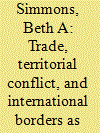

|
|
|
|
|
|
|
|